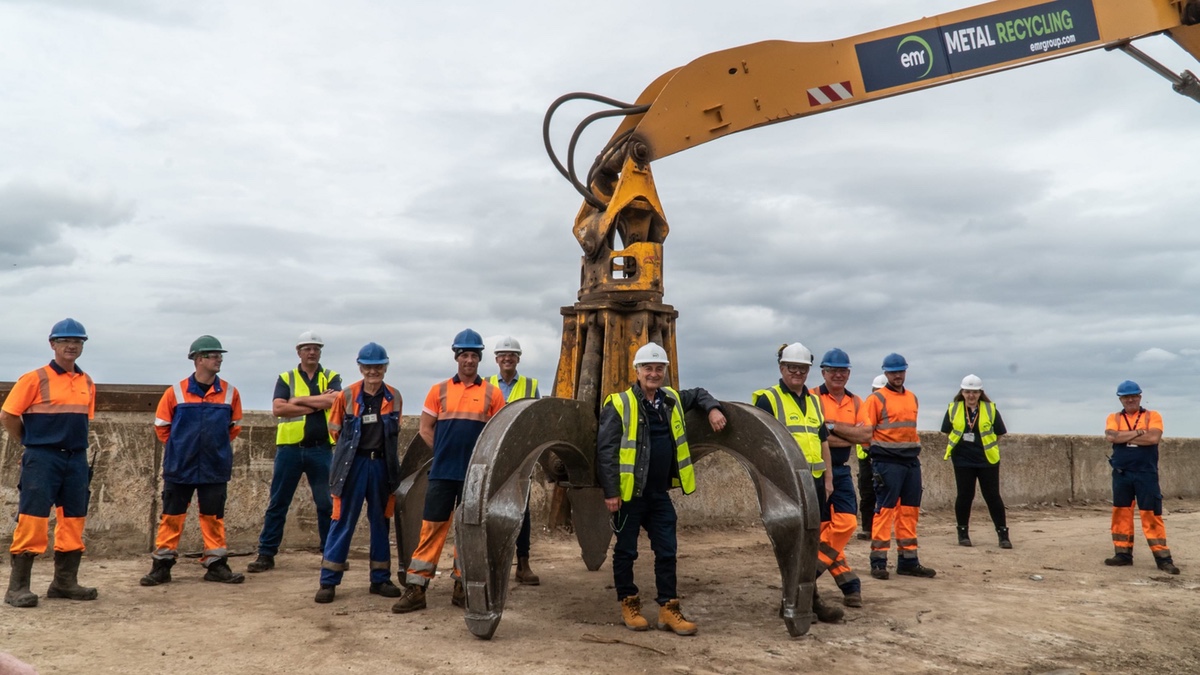CHOOSE
A DIFFERENT TERRITORY

Every time one of EMR's barges leaves its Erith metal recycling facility in North Kent loaded with 600 tonnes of scrap, it saves approximately 350 kg of carbon dioxide (CO2) from being released into the atmosphere. The use of this ancient river as a modern solution to EMR's sustainability efforts is featured in the latest episode of The Secret Life of the Thames with Tony Robinson on Channel 5 [9pm, Wednesday 20 January].
EMR’s General Manager at Erith, Jacques Meyer says using the Thames to transport metal to Tilbury Dock has benefits not just for EMR but for Greater London as a whole: “If you use the river for freight, you don’t have lorries sitting in traffic spewing out CO2.”
But the benefits of using the Thames, which the company has been doing since 2010, aren’t limited to sustainability.
“A big driver for us using the Thames at first was safety,” says Jacques, who has overseen the use of the River at Erith since the beginning.
“Yes, we want to move material quickly between sites, but we don’t want dozens of lorry drivers here because putting people into the equation means there’s more potential for accidents,” he says.
The EMR team were fortunate that an alternative to road haulage was readily available. “We thought ‘well we have the Thames on our doorstep –let’s use it,’” he says.
While using the Thames cuts the number of people on-site, it also creates a new set of safety challenges. All EMR employees at Erith are provided with in-depth training on how to work safely alongside the fast-flowing tidal waterway.
“If you’re going to work anywhere near the water you have to wear life jackets and have training,” says Richard Burkin, Quality and Process Improvement Manager at EMR.
Richard has been with EMR for 31 years and says the level of safety training has transformed in his time at the company.
“When I first started in the industry, you would be expected to get to work immediately. We have a couple of new starters at the moment and they won’t be turning keys on any machinery for another two weeks, after intensive training,” Richard says.
A huge increase in efficiency is the other clear advantage working on the Thames provides. “Using barges on the Thames means you can operate in bulk,” says Jacques. “With our river barges we can load up to 600 tonnes in two hours; if you did the equivalent on road, you need to load 25 lorries. That alone can take eight to 10 hours.”
The Thames is also home to a precious ecosystem that includes seals, salmon and even the occasional visit from a pod of dolphins, so the EMR team must ensure it treats the river with the utmost respect.
Jacques says: “As a recycling company we want to have a positive impact on the environment, but there’s no point wanting to make the world a better place if we don’t treat the river respectfully.”
Being a responsible river user means EMR has strict policies and procedures to ensure that the EMR team and the River are protected at all times.
“Thankfully we have never had any accidents. If, God forbid, we have any accidents, we have all the facilities here to act quickly and efficiently to protect the river,” says Richard Burkin.
Managed correctly, using the river for freight can have a positive impact on the river’s wildlife, improving the aeration of the water and pushing silt out into the sea.
Despite the river offering a much-needed sustainable mode of transport for London’s businesses, Richard says the Thames is less used now than he has ever known.
“It’s sad to see how quiet the river is these days. You’ve got this huge waterway with companies dotted up and down and it isn’t being utilised. It’s like having a six-lane motorway in the city and only having a few cars on it,” he says.
With EMR showcasing the business benefits of using the Thames perhaps more firms will now choose this natural and sustainable mode of transport.